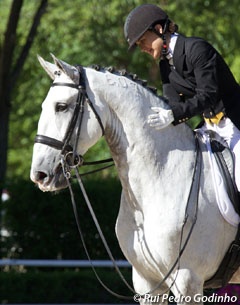
There is a very well known saying that “Rome wasn’t built in a day." A rider must always keep in mind that you will not get to Grand Prix in one lesson. My idol Nuno Oliveira used to say that you must finish every exercise with the horse still ready to give more and never when he has begun to be bored, or physical/mentally tired. Carl Hester interestingly also noted in an article that he only every rides his horses for 20 to 30 minutes each day. So why then do I still see riders begin their lesson at 10, finish at 12, and then wonder why their horse had to take time off.
I think there is a common misconception that you can tire a horse out. This may be true, but the truly athletic horses will either only get fitter and fitter, or bored and frustrated. He will start telling you quite obviously that you need to give it a rest. I have learnt this from experience, but of course every horse is different.
Nuno Oliveira always stressed to his students the importance of finishing the horse before he has had enough, and on a good note. Now this is tricky, because riders are often perfectionists and they think “oh just one more half pass, that will be the good one." They repeat and repeat, until the horse is so sick of the half pass, and the rider is exhausted.
Riders must find the line, between finishing on a high and finishing with a horse still interested. This is often what makes a rider a good trainer, as opposed to just a pretty position on a horse.
I know that if I go over Batialo’s point of enthusiasm, he will not get tired, he will snap into “foof” mode and barge around until I give up. Horses of that power and stamina don’t get tired, they get bored and for me the most important and interesting part about my dressage journey, is learning new ways to keep Batialo interested; always rewarding and stopping before he has decided it’s enough.
Of course people will tell me that he rules me then and that I need to ride through it. That might work for them, but I am not a strong rider. I am small, Batialo is big, and the only hope I have of training that horse is to keep him wanting to train with me. That is a partnership. Having a horse that runs to you at the stable, and flips his head sideways and follows you around like a lost retriever, is what makes what we do special. If you want a sport where you can play with the same thing for hours take up golf!
So, in order to achieve this - this concept of keeping the horse interested, end on a high, while also making the lesson worth while - is by learning to focus on particular points. I was never very good at this. I would go out to ride and do a half pass, and then do some changes, and then do some walk pirouettes, and end up doing almost all of our repertoire without actually improving on a single thing. Often people think that dressage is about movements, but in reality dressage is about gymnastics, and the movements are simply the means to create a horse that is supple, and elastic, and with impulsion and cadence. The movements are the building blocks to get to where you want to go, they are not the end point.
To help curve my over enthusiastic training regime, I wrote a daily calendar. Monday trot work, Tuesday half passes, wednesday pirouettes etc. This does not mean I went out on tuesday and just did half passes, but Tuesday's lesson was structured around that. I would do my usual warmup, then I would begin the shoulder-in, and the leg yielding, and afterwards work to prepare for the half pass. I would begin the work in the half pass, but not just doing a half pass from H to X. I would go up the three quarter line, three steps of shoulder in, three steps of half pass, creating energy, and spring in the trot, and teaching Batialo to respond to my aids not just to his memory of X to H half pass, great that’s done. I might finish the lesson with a half pass each way, but I would not spend the half pass lesson just doing the half pass. Then I’d finish, and that would be my focus for that day. I would not then do half an hour of canter and flying changes. If a child is learning how to dance, you don’t pop him in a tap class and then change to the samba half way though.
Horses need to understand and they need to be entertained. We as riders need to remember that dressage is not about getting the half pass to go from X to H, but about the suppling and the bending, and the aids, and all the millions of tiny things that happen in order to get that half pass to be in balance, with expression, with bend, and above all with a horse who still loves to do it.
by Sarah Warne - Photo © Rui Pedro Godinho